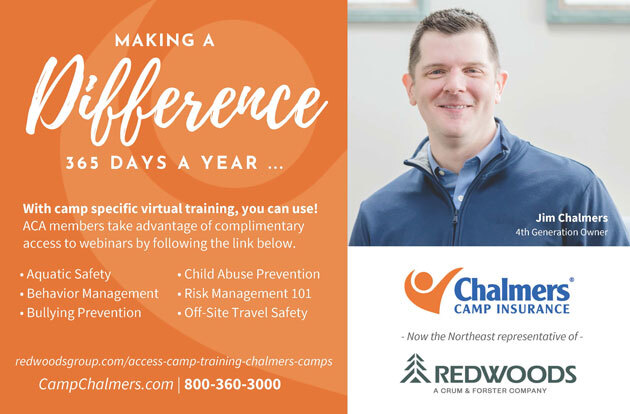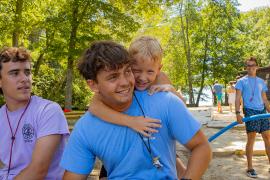The COVID-19 pandemic has drastically changed life for many of us, and nearly everyone is experiencing some form of loss this summer — loss that may continue into the foreseeable future. We recently sat down for a frank discussion about kids and grieving and how camps can offer support and compassion during this difficult time.
Discussion Participants
Vicki Jay, CEO of the National Alliance for Grieving Children
The National Alliance for Grieving Children (NAGC) is a nonprofit organization that raises awareness about the needs of children and teens who are grieving a death and provides education and resources for anyone supporting them. The goal of this network of professionals across the US, Canada, and beyond — mental health professionals, social workers, day care providers, school workers, etc. — is to ensure best practices and educational resources to facilitate the mental, emotional, and physical health of grieving children and their families.
Bethany Gardner, Eluna director of bereavement programs, and Molly Sedlik Hasson, Eluna Resource Center director
Founded in Seattle, Washington, in 2000 by former MLB pitcher Jamie Moyer and child advocate Karen Phelps Moyer, Eluna (originally The Moyer Foundation) is a public, 501(c)(3) nonprofit with a mission to support children and families impacted by grief or addiction. Among Eluna’s programs supporting thousands of children and families at no cost to them are: Camp Erin, the largest national bereavement program for children and teens grieving the death of someone close to them; Camp Mariposa, a year-round addiction prevention and mentoring program for youth who have experienced a substance use disorder by a family member; and the Eluna Resource Center, which offers both a robust online library of resources and personalized support to help grieving children and families thrive.
What’s your organization’s working definition of grief?
Jay: Our organization came together to support bereaved children who experienced the death of a parent, sibling, or other loved one. Grief is an internal response to an external event. We work really hard with kids to give them the tools to express the inside. Currently our world is using a much looser definition of grief as we talk about COVID-19 and the issues of inequity and all the loss and change that are related to those two national issues. That brings up so many feelings of grief, whether an actual death is involved or not. We’re grieving the loss of dreams, the loss of freedom. Grief is one of those words we have to leave up to the individual to define, but when we advocate, we are doing so for those who have experienced someone’s death.
Gardner: In terms of the campers who attend our camps, we’re looking at children who have experienced a death loss, anyone significant in their lives. We support all causes of death and any time since the loss. When we think about our program objectives, it’s all behaviors, thoughts, and feelings that come from grieving and loss. We wanted to expand from the idea that grief is just sadness or tears. Many youth experience anger or guilt; lots of feelings come from loss.
What are some of the signs of grief?
Jay: It may be spasmodic in children and youth; they’re OK one moment but not the next. They don’t always wear their grief like we adults do. They hide and disguise it — many times for us. If they’re different than they were before, that could be a sign. Just looking for changes in behavior, performance, and reactions is the best way to tell if a child may be grieving a loss or significant change.
How do you think camps can help children who are experiencing grief?
Gardner: We can expect that many of our campers are grieving over change of routine or loss of experiences. When staff think about being with youth, our work is to be a supportive witness to that child’s experience. Don’t be afraid to talk about the loss. Ask questions to put the ball in the camper’s court and then practice reflective listening. The expectation is not to be a therapist, but just to be a good listener.
Jay: Provide an array of opportunities to talk about feelings and emotions and give them permission to talk about it. Whether you’re outside walking trails or doing a group activity, spend some time just asking questions and listening to the answers. Say, “Hey, tell me about your world. What are you excited about? What are you worried about? What’s the best thing that’s happened? What’s the worst?” Those discussions can take place in large groups or small groups.
Staff should follow up. And be aware that dialog isn’t always the best tool for kids. They often do grief work through emotions and creativity. Sometimes words aren’t big enough; they can’t find the right ones to express themselves. Art projects are a great way to get campers to express their emotions without words.
How should we be preparing our camp staff to deal with others’ grief and grief of their own during the camp season?
Jay: Make sure they’re comfortable in their own reactions to grief topics. Whether it’s losses related to COVID-19 or something else, grief is a part of life. Kids are always going to be experiencing changes and losses. When grief strikes a family, it usually strikes the whole family. It often takes an outside, neutral person to provide the support children need, and camp personnel have the opportunity to spend a lot of quality time being that for children and teens.
Bethany and Molly, I know your camps’ focus is on helping children through grief. Do you have any suggestions for camps that aren’t specifically focused on that? Because, whether in person or online this summer, they will encounter children who are grieving a wide range of losses.
Hasson: A lot of camp directors have skills for creating special moments. They can utilize those skills to create such moments around loss and acknowledge the shared experience of loss to create community.
We definitely have resources on how to talk with kids. One of our most popular resources is 10 Things Grieving Kids Want You to Know.
Gardner: In most regions there are grief support organizations, and most of the time they are free of charge. Call those organizations or reach out to Eluna’s Resource Center. Our programs are built on peer support.
Do you think anything positive can come out of the grieving happening because of the COVID-19 pandemic? Is there some way we can find a lesson in this, so children experiencing grief now will recognize it in future circumstances?
Gardner: Usually we’re all moving so quickly. All change is loss, and all losses must be grieved. There is something significant about this major pause. It’s requiring us to slow down and really feel what’s in our bodies. It’s an opportunity for adults to be with our experiences and therefore help kids to be with theirs.
Jay: There are many positives. Our families are spending more time together. As a nation, we are more often identifying ourselves as grievers. It’s given us a common loss to talk about. It’s put the topic on the table. It’s not whether we’re going to be faced with grief, it’s what we’re going to do about it. It’s a call to action, and we’re going to come out stronger on the other side.
Any other advice you’d give camp directors and other staff members who may be in the position to identify children dealing with grief due to COVID-19 or other circumstances?
Jay: I would just say the time you get to spend with kids in a camp environment is precious and ripe for heartfelt conversation. I hope everyone maximizes that opportunity. And if you know a child who has a need, there are people out there who can help, so make sure you seek them out. NAGC is one of those resources.
Hasson: As leaders in your communities, you are not alone. You have each other and organizations like ours. The heart of the camp experience is kids walking away knowing that they are not alone.
Interview conducted by Marcia Ellett, editor in chief of Camping Magazine.
| Additional Resources |
|




